Do you have a crime that needs solving?
Do you have a dog that needs walking?
Do you have a wife that needs spanking?
Let George do it. Danger’s my stock-in-trade.
If the job’s too tough for you to handle,
you’ve got a job for me,
George Valentine.
Write FULL Details
Let George Do It (1946-54) aired “No Escape from the Jungle” on March 26, 1951 as the 237th of its 414 original episodes. This is but the third episode of the show we have showcased, the first just over a year ago, so I felt it was time to reprise the initial introductory notes for newcomers to this popular program. The George of the title was an ex-GI now home and trying to find his place in civilian society after the war. Intentional or not, George Valentine, as an “everyman” character the common man could relate to, who exhibited no special abilities to speak of, found his calling as a freelance investigator, but not the usual hardboiled gumshoe in the mold of Mickey Spillane or Sam Spade. Like the character Dan Holiday of the radio program Box 13, who placed a classified ad in the newspaper soliciting his services, George used the same approach—see the Personal Notice above and in the ad below. While the first few lines of the ad would change from time to time the ad always ended with the lines: “Danger’s my stock-in-trade. If the job’s too tough for you to handle, you’ve got a job for me, George Valentine. Write FULL Details.” George’s cases ran the gamut as did those of other private investigators or detectives: theft, blackmail, abduction, scams, political malfeasance or worse, and of course murder. But there were also the oddball cases that provided a welcome freshness and change of pace to the program which would make George Valentine one of America’s more popular radio characters.
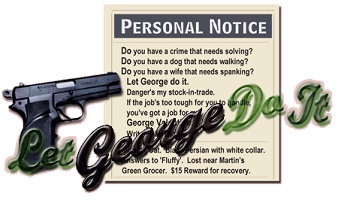
George Valentine was played by none other than Bob Bailey (1913-1983, photo top right), who would go on to be the star in one of radio’s most beloved programs, Yours Truly, Johnny Dollar (1949-62), where he would become the most famous of Dollar’s voices from 1955-60. Though he had been a supporting or bit actor in numerous shows before he hit it big as the star of Let George Do It, this was Bailey’s first starring role in a major program, and he made it his own, stepping down for only the final 37 shows (January through September of 1954).
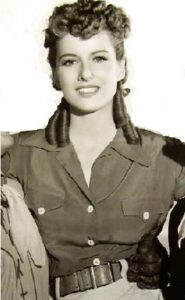 George Valentine’s loyal assistant/secretary and love interest was Claire Brooks, affectionately known as “Brooksie,” who was perfectly played by Frances Robinson (1916-1971, photo at left), and then others including Virginia Gregg who would follow Bailey to Yours Truly, Johnny Dollar as his secretary Nancy Turner. Both Robinson and Gregg would play Brooksie as “smart and sassie” as one source characterized their interpretation of the role, but it was Robinson’s little touches that made her Brooksie priceless, as when she made it clear on more than one occasion that “the case he was the most off base on was the ‘Case of the Missing Engagement Ring.’” The charming way she presented Brooksie to the program’s loyal listeners was evident, which led one critic to comment that “Frances Robinson’s Brooksie remains one of Radio’s most endearing and versatile sidekicks. Lilian Buyeff, Shirley Mitchell and Virginia Gregg would later replace Frances Robinson over the years, but despite their own considerable talents, could never completely erase the memory of Frances Robinson’s absolutely letter-perfect characterization of Brooksie.” Robinson also enjoyed a film and TV career, appearing in more than a dozen films, a couple of interest to science fiction fans include The Invisible Man Returns (1940) and 1941’s Dr. Jekyll and Mr. Hyde. She would die of an apparent heart attack at the much too early age of 55 on August 16, 1971.
George Valentine’s loyal assistant/secretary and love interest was Claire Brooks, affectionately known as “Brooksie,” who was perfectly played by Frances Robinson (1916-1971, photo at left), and then others including Virginia Gregg who would follow Bailey to Yours Truly, Johnny Dollar as his secretary Nancy Turner. Both Robinson and Gregg would play Brooksie as “smart and sassie” as one source characterized their interpretation of the role, but it was Robinson’s little touches that made her Brooksie priceless, as when she made it clear on more than one occasion that “the case he was the most off base on was the ‘Case of the Missing Engagement Ring.’” The charming way she presented Brooksie to the program’s loyal listeners was evident, which led one critic to comment that “Frances Robinson’s Brooksie remains one of Radio’s most endearing and versatile sidekicks. Lilian Buyeff, Shirley Mitchell and Virginia Gregg would later replace Frances Robinson over the years, but despite their own considerable talents, could never completely erase the memory of Frances Robinson’s absolutely letter-perfect characterization of Brooksie.” Robinson also enjoyed a film and TV career, appearing in more than a dozen films, a couple of interest to science fiction fans include The Invisible Man Returns (1940) and 1941’s Dr. Jekyll and Mr. Hyde. She would die of an apparent heart attack at the much too early age of 55 on August 16, 1971.
“No Escape from the Jungle” finds George accepting a case from a research chemist working for a Burmese rubber plantation, a Mr. Van Rossell, now visiting Los Angeles for the first time. Van Rossell hires George to find an acquaintance of his, a man he knew briefly in Burma, a traveling lecturer named Holliwell, a man also now in Los Angeles who is “here, but not here.” From this vague tidbit and as much information as he can extract from Van Rossell, George soon finds himself compelled to follow several thin clues, each giving rise to yet another, with each seemingly pointing in the direction of the whereabouts of the lecturer and more importantly, why Van Rossell wants him found in the first place. What George eventually discovers as the answer to the initial riddle is not at all what he expected but fortunately turns out to be the key to unlocking the answer to a rather surprising revelation I daresay he nor Brooksie saw coming. All of which, in retrospect, illustrates why this odd story is just another example of the sort George finds himself involved in, where sometimes it is the journey itself that makes for the most interesting cases, which we find “No Escape from the Jungle” most certainly to be.
(The linked CD at top includes this episode and 19 others.)
Play Time: 29:57
{“No Escape from the Jungle” aired on a Monday evening in late March of 1951. The neighborhood gang couldn’t wait to meet at the corner newsstand the following afternoon after school, for with nothing but a full week of tedious boredom ahead of them at school they would need something to match the drama they experienced from listening to their favorite radio programs in the evening. They found a goodly measure of what they were looking for in their selections below. Detective Tales (1935-53) was near the top of Popular Publications stable of detective magazines. Its winning formula meant its loyal readership kept the pulp on a monthly schedule for almost the entirety of its 18-year run, switching to a bi-monthly with its April 1951 issue, which lasted until its demise in August of 1953. Dime Detective (1931-53), like its fellow pulp detective from Popular Publications, published monthly (twice monthly from 1933-35) for almost its full run of 22 years, gearing down (again like its counterpart) to a bi-monthly schedule with its own April 1951 issue. Its final presence on the newsstand was also with its August 1953 issue. fantastic Adventures (1939-53) was another of publisher/editor Raymond A. Palmer’s many magazine titles and was founded as a companion pulp to science fiction’s first official magazine, Amazing Stories. At least one historian has noted that it published much light and “frothy” fantasy early on, but by the late 1940s, aside from being even more fantastical in nature than Amazing, published much the same sort of material. It was a monthly in 1951.}
[Left: Detective Tales, 3/51 – Center: Dime Detective, 2/51 – Right: fantastic Adventures, 3/51]
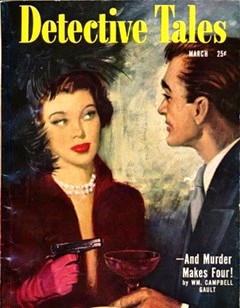
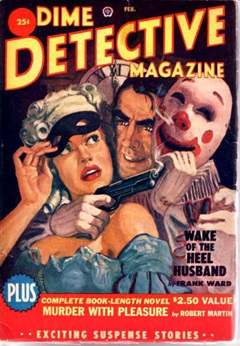
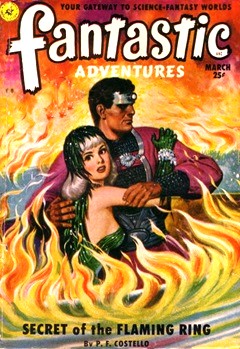
To view the entire list of weekly Old Time Radio episodes at Tangent Online, click here.
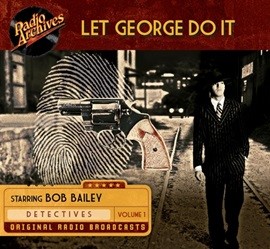
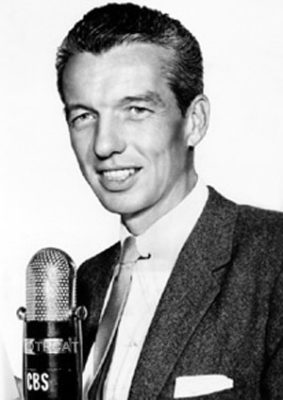 Personal Notice:
Personal Notice: